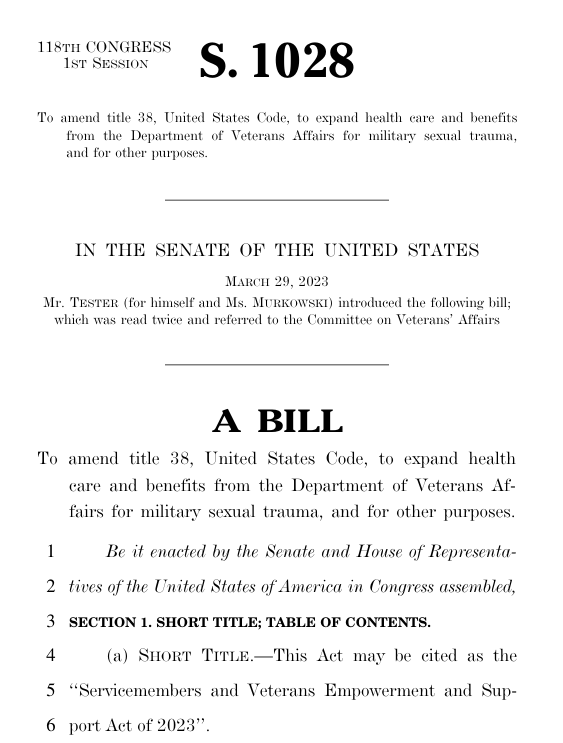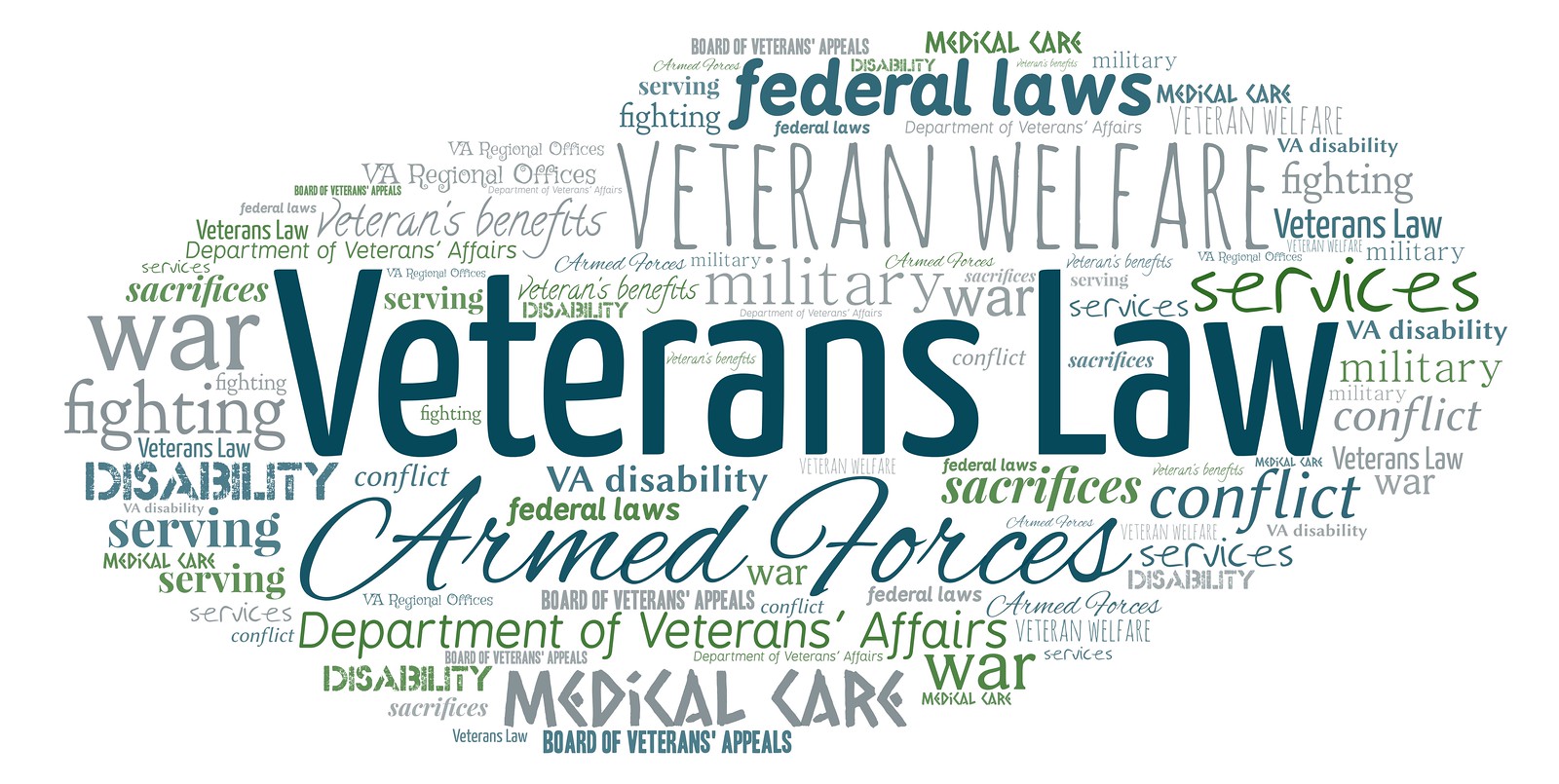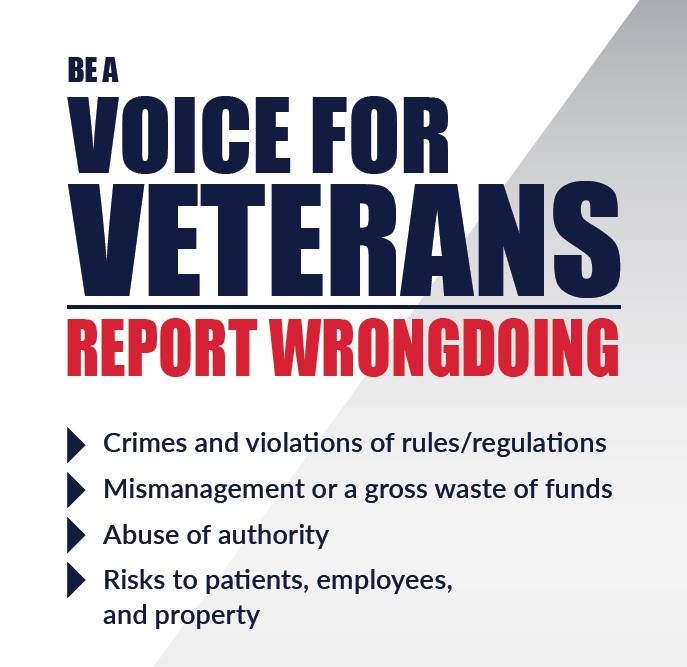- Home
- Federal Policies for Veterans
- VA Standard of Proof
VA Standard of Proof for non-PTSD, MST-related Disability Claims
June 7, 2024 – VA standard of proof language removed in the most recent version of the legislation. (continued below)
On this page ...
- 117th Congress – Servicemembers and Veterans Empowerment and Support Act of 2021 (S. 3025)
- 118th Congress – Servicemembers and Veterans Empowerment and Support Act of 2023 (S. 1028)
- Bill's Passage in Doubt
- Previous Posts (2022)
Senators Tester and Murkowski introduced the Servicemembers and Veterans Empowerment and Support Act of 2023 (S. 1028) during the 118th Congress (2023-2024).
The new bill removed the "standard of proof" language from the title of Section 203 of the bill for reasons I do not fully understand. They also renumbered the proposed new section from § 1167 to § 1166A.
I think the effect of the revised language would be the same, viz., that veterans diagnosed with, for example, Major Depressive Disorder that developed subsequent to a military sexual trauma, would have their claims adjudicated in the same manner as veterans diagnosed with PTSD, as delineated in current VA regulations:
- "evidence from sources other than the veteran's service records may corroborate the veteran's account of the stressor incident" and
- "evidence of behavior changes following the claimed assault is one type of relevant evidence that may be found in these sources." – 38 C.F.R. § 3.304(f)(5)
If you understand these intricacies of legislative language and VA claims adjudication and can offer a more knowledgeable explanation, please comment below or communicate with me directly. (I will post your explanation here, and of course give you credit, unless you request otherwise.)
Here is a comparison of the language in the previous (2021) bill with the current (2023) Servicemembers and Veterans Empowerment and Support Act:
117th Congress – Servicemembers and Veterans Empowerment and Support Act of 2021 (S. 3025)
SEC. 203. STANDARD OF PROOF FOR SERVICE-CONNECTION OF MENTAL HEALTH CONDITIONS RELATING TO MILITARY SEXUAL TRAUMA.
(a) In General.—Subchapter VI of chapter 11 of such title is amended by adding at the end the following new section:
Ҥ 1167. Evaluation of claims involving military sexual trauma
118th Congress – Servicemembers and Veterans Empowerment and Support Act of 2023 (S. 1028)
SEC. 203. EVALUATION OF CLAIMS INVOLVING MILITARY SEXUAL TRAUMA.
(a) In General.—Subchapter VI of chapter 11 of such title is amended by inserting after section 1166 the following new section:§ 1166A. Evaluation of claims involving military sexual trauma
(a) In General.— (1) In the case of any veteran who claims that a covered mental health condition based on military sexual trauma was incurred in or aggravated by active military, naval, air, or space service, the Secretary shall consider the following:
(A) A diagnosis of such mental health condition by a mental health professional.
(B) A link, established by medical evidence, between current symptoms and a military sexual trauma.
(C) Credible supporting evidence, in accordance with subsections (b) and (c) that the claimed military sexual trauma occurred.
...
SEC. 203 (i) Definitions.—In this section:
(1) The term ‘covered mental health condition’ means post-traumatic stress disorder, anxiety, depression, or other mental health diagnosis that the Secretary determines to be related to military sexual trauma and which may be service-connected under section 1110 of this title.
https://www.congress.gov/bill/118th-congress/senate-bill/1028/text#id3e977e9f-9018-4256-a53d-1c97208af51e

Bill's Passage in Doubt
Linda F. Hersey, $392M price tag stalls bill to expand veterans benefits connected to military sexual trauma, Stars and Stripes [published on American Legion News website] (May 9, 2024).
Legislation requiring the Department of Veterans Affairs to accept crisis center reports, personal statements and other evidence to support disability claims for military sexual trauma when an official report is missing from records has stalled in Congress over a projected $392 million cost to deliver the benefits through 2032, according to lawmakers. (Read more ...)
Previous Posts (2022)
VA standard of proof for MST-related disability claims based on mental disorders other than PTSD could change if the Senate passes the Servicemembers and Veterans Empowerment and Support Act of 2021 (S. 3025) and the House of Representatives subsequently passes the legislation and the President signs it.
Sponsored by Sen. Jon Tester (D-MT) with cosponsor Sen. Lisa Murkowski (R-AK), Section 203 of this bill1 would require VA to adjudicate claims for MST-related mental disorders such as major depressive disorder, panic disorder, or post-traumatic stress syndrome (partial PTSD) in the same manner as MST-related PTSD claims.2,3
Section 203 says:
[VA] shall accept as sufficient proof of service-connection a diagnosis of a covered mental health condition by a mental health professional together with satisfactory lay or other evidence and an opinion by the mental health professional that the evidence indicates such trauma occurred and the mental health condition is at least as likely as not related to military sexual trauma, notwithstanding the fact that there is no official record of such incurrence or aggravation in service, and, to that end, shall resolve every reasonable doubt in favor of the veteran. (edited for clarity)
VA Standard of Proof — Again?
I thought that the Johnny Isakson and David P. Roe, M.D. Veterans Health Care and Benefits Improvement Act of 2020 (Pub. L. No. 116-315, 134 Stat. 4932) had resolved the problem by explicitly defining "covered mental health condition" as applied to MST-related claims (it's in Section 5501 of the Act).4
The Act established a new statute, 38 U.S.C. 1166(c)(1), which states:
The term ‘covered mental health condition’ means post-traumatic stress disorder, anxiety, depression, or other mental health diagnosis described in the current version of the Diagnostic and Statistical Manual of Mental Disorders published by the American Psychiatric Association that the Secretary determines to be related to military sexual trauma.
But it seems that was not sufficient, presumably because the definition occurred in a section of the bill that does not directly address claims adjudication. [edited on 7 Jun 2024]

Some rights reserved. The image above is licensed under Attribution (CC BY 2.0), which means you can use the image on your blog/website as long as you provide credit with an active link to the creator's website (click the image above to visit the creator's website).
Footnotes for VA Standard of Proof
1. S. 3205, 117th Cong. § 203 (2021, amended 2022).
2. A constellation of post-traumatic stress symptoms that cause functional impairment or significant distress but do not satisfy all of the DSM-5 diagnostic criteria for PTSD are referred to by several different terms, such as:
- post-traumatic stress syndrome
- subthreshold PTSD
- partial PTSD
- subsyndromal post-traumatic stress
These conditions are usually assigned a DSM-5 diagnosis of Other Specified Trauma and Stressor-Related Disorder. The ICD-10-CM code associated with that diagnosis is F43.8 Other reactions to severe stress.
Note that DSM-5 does not have its own diagnostic coding system. Instead, DSM-5 uses ICD-10-CM codes. Sometimes a precise correspondence between a DSM-5 diagnosis and an ICD-10-CM diagnosis does not exist. In those instances DSM-5 uses the ICD-10-CM code for a similar disorder.
3. 38 C.F.R. § 3.304(f)(5) details the service-connection criteria for PTSD due to in-service personal assault.
4. Evaluation of Service-connection of Mental Health Conditions Relating to Military Sexual Trauma, Johnny Isakson and David P. Roe, M.D. Veterans Health Care and Benefits Improvement Act of 2020, Pub. L. No. 116-315, § 5501(a), 134 Stat. 4932, 5048 (Jan. 5, 2021); see also Technical Correction, which explains minor changes introduced by Pub. L. 117–16, § 7(a)(1), 135 Stat. 284 (June 8, 2021).
PTSDexams.net is an educational site with no advertising and no affiliate links. Dr. Worthen conducts Independent Psychological Exams (IPE) with veterans, but that information is on his professional practice website.
Subscribe to receive new articles and other updates
What Do You Think?
I value your feedback!
If you would like to comment, ask questions, or offer suggestions about this page, please feel free to do so. Of course, keep it clean and courteous.
You can leave an anonymous comment if you wish—just type a pseudonym in the "Name" field.
If you want to receive an email when someone replies to your comment, click the Google Sign-in icon on the lower right of the comment box to use Google Sign-in. (Your email remains private.)
↓ Please comment below! ↓



